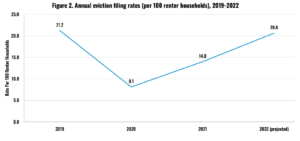Learning from COVID-19 Eviction Response Measures in Detroit
Download PDF of full policy brief
Download PDF of related working paper
Introduction
Mass evictions threatened public health long before the onset of COVID-19. Because the power and property relationships that give rise to eviction are structured by systematic racism, capitalism, and gender-based oppression, eviction is an omnipresent feature of low-income tenancy that disparately impacts renters of color, particularly Black women and children. Eviction disrupts education and destabilizes communities, precipitates job loss and homelessness, and leads to overcrowded, poorer quality housing. Stable housing is a human right and a cornerstone of health and well-being; a wide body of research links the stress, trauma, and material fallout of eviction to an array of adverse health consequences like depression, anxiety, chronic disease development, and premature death.
As COVID-19 caused massive disruptions to lives and livelihoods beginning in March 2020, the life-or-death consequences of eviction could no longer be ignored. To prevent millions of evictions that would have exacerbated the spread of COVID-19 and related morbidity and mortality, policymakers made abrupt changes to eviction policy, placing moratoria on various stages of the eviction process, modifying court procedures to give tenants the opportunity to access services and exercise their rights, and allocating unprecedented public funding for emergency rental assistance, and legal aid.
COVID-19 eviction response measures sought to prevent a wave of mass evictions brought on by the economic impacts of the pandemic, but cities across the U.S. have long endured a flood. In Detroit–a majority-Black city where most poor renters reside in the private rental market, receive no housing assistance, and spend half of their incomes on housing–landlords threatened 1 in 5 tenants with eviction each year prior to the pandemic. In Detroit and cities like it, COVID-19 eviction response measures stood to disrupt a status quo of unjust and unmitigated mass displacement.
This brief analyzes trends in eviction filings and outcomes since the start of the pandemic using a dataset of evictions filed in Detroit between January 2019 and June 2022. The findings demonstrate that new levels of eviction prevention are attainable when policymakers treat eviction like a public health crisis rather than a property dispute. Yet even with a range of prevention measures in place, evictions remained a pervasive threat. The most robust eviction protections were short-lived, and unprecedented public investments in rental assistance and legal aid programs did not remedy the power imbalance between landlords and tenants that pervades the legal eviction process. Major policy and enforcement gaps contributed to thousands of avoidable evictions.
As eviction filings return to pre-pandemic levels and rents across the U.S. soar to new highs, decision makers can choose to normalize this public health crisis or work to monitor, prevent,
and eradicate it. This brief calls upon elected officials, housing advocates, and organizers to learn from and act upon evidence from Detroit to promote housing and health justice, during the pandemic and beyond.
Key Findings
- Landlords filed fewer evictions during the pandemic, and eviction judgments and bailiff evictions declined while COVID-19 response measures were in effect. But filings increased since the lapse of state and local moratoria, rising to 75% of the pre-pandemic level in 2022 as protections waned. At the current filing rate, 21% of Detroit renters (61,000 tenants) will face the threat of eviction this year.
- The share of evictions filed for termination of tenancy (including no-cause evictions) increased 70% after the COVID-19 Emergency Rental Assistance (CERA) program began, leaving 1 in 3 tenants who faced eviction in 2022 without protection. Tenants being evicted for termination of tenancy were twice as likely as tenants facing eviction for nonpayment to receive a judgment.
- Default judgments against tenants who did not appear in court remained the primary cause of tenants’ eviction, despite declining 44% during the pandemic. Eighty-three percent of tenants evicted during the pandemic never had their day in court, equivalent to one-quarter of all closed cases.
- Roughly 9 in 10 pandemic-era eviction filings involved properties operated unlawfully by landlords in violation of the City of Detroit’s rental ordinance, despite the law stating that landlords may not occupy rental units or collect rent without a Certificate of Compliance (CoC).
- Tenants’ access to legal counsel increased during the pandemic, but still just 1 in 5 tenants had full legal representation, and landlords were four times more likely than tenants to have attorneys.

Policy Recommendations
Monitoring Evictions
- Collect and evaluate eviction data.
- Automatically seal eviction records.
Preventing Evictions
- Enforce rental codes.
- Establish protections against no-cause evictions.
- Make the right to counsel a reality.
- Continue and improve efforts to reduce default evictions.
- Ban winter and school-year evictions.
- Establish an eviction diversion program.
Eradicating Evictions
One lesson learned from COVID-19 eviction response measures in Detroit is clear: evictions are preventable, but they are inevitable within a for-profit system that prioritizes landlords’ investment interests over tenants’ health and human right to shelter. Housing justice can only be attained by eradicating the U.S.’s racially unjust eviction crisis, and doing so will require reparative policies that guarantee housing as a social good, not a real estate commodity. Officials at all levels of government have the power and resources to expand social housing that is permanently affordable, protected from the private market, and publicly owned or under democratic community control.46 A truly just transition to a system of socialized housing must be directed by and accountable to the people most impacted by systematic displacement who have been traditionally excluded from decision-making processes. Across the U.S., including in Detroit, an organized tenant movement has championed a range of political solutions. As researchers, we urge decision makers to work alongside tenants to bring about their visions for housing justice.
